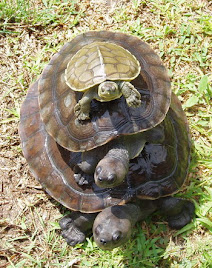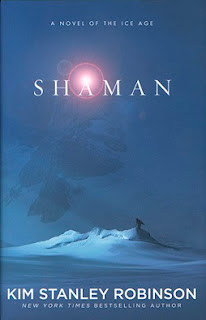Turtles All the Way Down, spirals all the way out
Turtles All the Way Down, spirals all the way out
Book: Turtles all the Way Down; Author: John Green; Listened to on audiobook
Finished January 2023
Like all the books on this blog, I liked it... but this one I liked just ok. This is a YA book, but I don't think I would have made it through the book at that age. The protagonist has compulsive thoughts that spiral out of control — with the main worry being an irrational fear of acquiring a C. diff infection, but also a more existential compulsive worry that she as doesn't really exist in a sense. Part of this later fear comes from her lack of ability to control her own thoughts (so she has little confidence in her abilities of self-agency), and part comes from the factoid that non-human cells (like bacteria) outnumber human cells in the human body. So there's a lot to read through along the lines of "am I even me if I'm mostly made up of microbes?" When I was younger I likely wouldn't have had the patience or empathy to stick out the book with this character (but maybe I would have been more hooked by the philosophical and existential questions posed).You can't click "x"
One of the methods the character uses (from her psychologist) is to imagine an intrusive thought as an unwanted popup window on the computer you can just click an "x" to close. But it doesn't work. I'm not surprised this visualization doesn't work for the character because what most people do when they "click an x" is come up with a counter rationalization or are able to dismiss the thought. The protagonist, however, is largely unable to come up with counter-rationalizations that convince herself.
An example: when obsessing over the balance of microbes within her body, she always focuses on negative and potentially harmful bacteria rather than the majority of beneficial or harmless microbes within us. There is a wound she habitually opens and drains because she is obsessed with the idea that it might be infected, and therefore she must drain the blood and puss out. She doesn't think, 'but wait, even if there is some puss that's normal.' She doesn't look up facts about (or doesn't care about) how the production of puss is part of the body's normal defense mechanism, and that it doesn't usually need to be drained, etc. So her problem isn't that she has these thoughts, it's that she selectively focuses on the less likely but problematic thoughts, and on finding things she can physically do in response to them.
So, there's two parts to this (it seems to me). 1) Physically doing something, like drinking hand sanitizer, presumably gives her an immediate sensation of control. 2) The focus on negative possibilities is because the potential consequences for being wrong is bigger in her mind. What if she really does have an infection? And she dies because of it? Almost everyone's brain pays more attention to the negative consequences because the repercussions for ignoring these are often larger even if they're less likely. It's just a matter of degrees in terms of how much we favor considering these potential catastrophes... and the protagonist is highly skewed toward the cautious side.
Quotable parts (parts of which are originally from other sources)
"...‘He who doesn’t fear death dies only once,’ which I thought was maybe some veiled reference to his father, but I couldn’t unpack it. (For the record, he who does fear death also dies only once, but whatever.)"
This misinterpretation of the quote by the protagonist is a little infuriating because the obvious point is that (s)he who fears death too much actually dies (metaphorically) many times.... which is exactly what's happening to our protagonist, but she can't see it.
“At the end, when walking was work, we sat on a bench looking down at the river, which was running low, and she told me that beauty was mostly a matter of attention. 'The river is beautiful because you are looking at it,' she said.”
I love this quote, and yet I can't help but nitpick it. I agree you have to really be looking for someone or something to be beautiful. But It's not the driver.... looking is required to see beauty but does not cause something to be beautiful. A massacre doesn't become beautiful if you look closely enough.
"When observation fails to align with the truth, which do you trust? Your senses or your truth?"
-The Third Part of the Ecclesiastical History of John, Bishop of Ephesus by John of Ephesus.
It's a question I ask myself almost every day, but not as eloquently.
"'The greatest weapon against stress is our ability to choose one thought over another.' - William James. I don't know what superpower William James enjoyed, but I can no more choose my thoughts than choose my name."
There are a few times not being able to choose your name is mentioned and I HATE IT. Lots of people do change their names (legally or otherwise) every day for pretty important reasons (transitioning, distancing from problematic family members/namesakes, etc).
"At some point in life, the world's beauty becomes enough. You don't need to photograph, paint, or even remember it. It is enough."
- Toni Morrison
Toni Morrison never fails to impress. I appreciate standalone quotes like this because her writing is so poetic and beautiful I fall asleep almost immediately, and hence have yet to get through a book of hers. This quote I like because, often when we're being mindful and appreciating the moment, there seems to be an unspoken pressure that we should also be remembering it. I like the permission to just enjoy the moment, the beauty, and then forget it. I'm very forgetful. And very sleepy.
"What I love about science is that as you learn don't really get answers, you just get better questions."
This is said by a zoologist in the book. As a scientist I love it. A lot of people think scientists love knowledge and memorizing things. I (and many others) don't. At least not particularly. I love questions. I've noticed I have to be very careful when talking to reporters or students not to skip over the "fact sharing" part (what they want) and skip to the "questions at large!" part (what I find interesting/exciting). People, by and large, want answers. Scientists, who are unfortunately often in charge of finding and reporting the answers, somewhat infuriatingly want questions. So some communication frustration is inevitable. Thank you to science reporters and other intermediaries.
Final thoughts on spiraling out and in
The protagonist's final sentiments go something like this: You could spiral in and in on yourself, the spiral choking you as each obsessive worry leads to more. You could keep peeling back the layers of yourself as you go deeper, maybe finding no one there. Or you could spiral out, like the arms of the galaxy. Towards the end of the book, she does get a little better at seeing how self-obsessed she has been and starts trying to connect with others more. It makes me think of Dale Carnegie's "How to Win Friends and Influence People," which talks about, among other things, the fundamental life skill of taking a genuine interest in other people. This self-obsession of OCD makes her romantic arc in the book so unbelievable — it's hard to take this seriously as a "first love" encounter when they have only spent a short time together, and half of it she was so distracted by her self-obsessive thoughts that she wasn't able to process what he was saying (and later in the book she even muses that maybe he liked her because she didn't take too much of an interest in him — yikes). But it's when she realizes she's hurt her best friend by not taking an interest (and her best friend, let's be honest, handled this terribly) that she's more motivated to change her ways. However, at the end of this book, it's not clear if she's taking more of an interest in her best friend because she is genuinely interested in her friend, or because she just feels bad and is trying to improve her own self-image.
-G
Would reread? No




Comments
Post a Comment